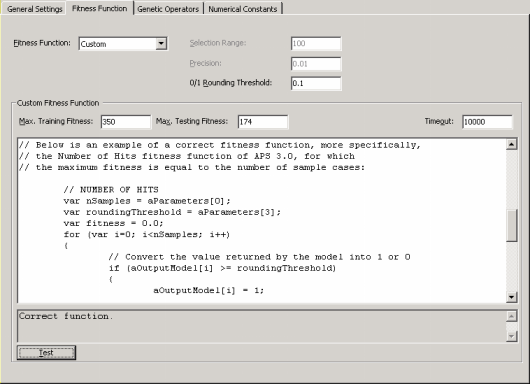For all classification problems, in order to be able to apply a particular fitness function, the
learning algorithms APS 3.0 must convert the value returned by the evolved model into “1” or “0” using the
0/1 Rounding Threshold. If the value returned by the evolved model is equal to or greater than the rounding threshold, then the record is classified as “1”, “0” otherwise.
Thus, the 0/1 Rounding Threshold is an integral part of all fitness functions used for classification and must be appropriately set in the Settings Panel -> Fitness Function Tab.

The root relative squared error fitness function (RRSE) of APS 3.0 is, as expected, based on the
standard root relative squared
error.
The root relative squared error Ei of an individual program
i is evaluated by the equation:

where P(ij) is the value predicted by
the individual program i for fitness case j (out of n
fitness cases); Tj is the target value for fitness
case j; and is
given by the formula: is
given by the formula:

For a perfect fit, the numerator is equal to 0 and Ei
= 0. So, the RRSE index ranges from 0 to infinity, with 0
corresponding to the ideal.
As it stands, Ei can not be used directly as fitness since, for fitness proportionate selection, the value of fitness must increase with efficiency.
Thus, for evaluating the fitness fi of an individual program
i, the following equation is used:

which obviously ranges from 0 to 1000, with 1000 corresponding to the ideal (the coefficient 1000 allows a fairer distribution of fitnesses for selection).
|

